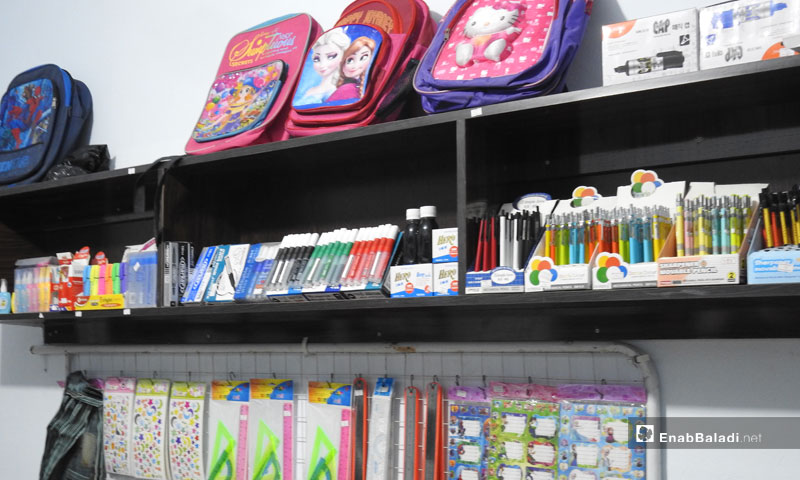The prices of school supplies have significantly increased during the new school year, posing more challenges and pressures on the people in Idlib and Aleppo countryside, who are already suffering from the high cost of living and the lack of job opportunities.
The schools have opened in early September, only to face various problems from lack of support to overcrowding, due to material damage caused by the recent military campaign, showing the financial burden on the faces of the parents while purchasing school supplies for their children.
The difference in prices in Idlib and Aleppo is attributed to the increase of the dollar exchange rate, and the shipping and delivering prices of school supplies to vendors, according to library owners interviewed by Enab Baladi.
The exchange rate of the dollar has risen against the Syrian pound to reach its highest level, as it approached the limit of 690 Syrian pounds at the beginning of September, before returning to decline to remain higher than last year’s rates, which were about 450 Syrian pounds.
Adaptation through economization
Parents are forced to reduce the amount of supplies they buy for their children, with the cost of basic school supplies per child ranging from 8,000 to 10,000 Syrian pounds, said Osama Mohammad, a library owner from the town of Dabiq in the northern countryside of Aleppo.
Stationery prices have increased by 30 to 40 percent compared to last year, Osama told Enab Baladi, pointing out that the passage of goods from Aleppo and Sarmada at barriers belonging to several parties is the reason for the increase in their cost for the sellers and buyers.
Hussein Ahmad, a father of five school-age children from the town, said that the situation is worsening. “It is very important for me that my children learn, but in order to prepare his son, one has to provide clothes, bags and stationery, and the worker cannot provide more than 50 to 60 thousand Syrian pounds a month.”
As for Mohamad Hassou, a displaced residing in the town, who is also a father of five children, the new burden requires him to distribute purchases in quarterly payments; otherwise, he will not be able to send his children to school.
Displacement and exploitation… And a new school uniform
In Idlib, the Salvation Government, which controls the province, issued a circular, on August 20, imposing a new school uniform for all grades, “based on the requirements of the public interest,” as it puts it.
The Salvation Government’s new resolution has been rejected by the people of the region, who suffer the consequences of the displacement of more than one million people from the southern regions of the governorate, because of the shelling and battles the Syrian regime and its Russian ally have been waging since last February, according to the figures by the Syrian Humanitarian Response Coordinators team.
Displaced Fayez Daghim told Enab Baladi that he completely rejects the idea of buying a school uniform, as he needs to secure “a thousand other more important matters”
Tailor Mohamed Gheribi estimated the cost of the uniform, as set by the Salvation Government, about 4,000 Syrian pounds for primary students, more than 5,000 Syrian pounds for preparatory students and about 7,000 Syrian pounds for high school students. The tailor also pointed to Enab Baladi that the prices vary according to the quality of the used fabric.
The stationary prices in Idlib are similar to those in Aleppo, Mannaa Gharibi, owner of “Byat Al-Riyadha” library in the village of Killi, north of Idlib, told Enab Baladi.
Mannaa, who is displaced from the southern countryside of Idlib, added that equipping the student with the minimum education requirements costs no less than $ 4 to be able to attend school.
The high costs may lead to the students’ deprivation of education, which Hashim Riad from Idlib is concerned about, as he considered that the parents are facing more difficulties in affording the expenses of education, saying: “If I want to equip all my children, I will need 15 thousand Syrian pounds, to buy them just the basic requirements, without even buying the uniform.”
According to UN statistics, more than a third of children in Syria are deprived of education and 1.3 million children are at risk of being deprived of it, while 83% of Syrians are below the poverty line.

